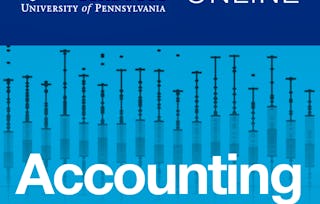In this course, you’ll explore how financial statement data and non-financial metrics can be linked to financial performance. Professors Rick Lambert and Chris Ittner of the Wharton School have designed this course to help you gain a practical understanding of how data is used to assess what drives financial performance and forecast future financial scenarios. You’ll learn more about the frameworks of financial reporting, income statements, and cash reporting, and apply different approaches to analyzing financial performance using real-life examples to see the concepts in action. By the end of this course, you’ll have honed your skills in understanding how financial data and non-financial data interact to forecast events and be able to determine the best financial strategy for your organization.

Ends soon: Gain next-level skills with Coursera Plus for $199 (regularly $399). Save now.

Financial Acumen for Non-Financial Managers
This course is part of multiple programs.


Instructors: Richard Lambert
47,319 already enrolled
Included with
(980 reviews)
Skills you'll gain
- Performance Measurement
- Financial Management
- Financial Data
- Financial Reporting
- Financial Acumen
- Business Modeling
- Financial Forecasting
- Performance Analysis
- Risk Analysis
- Business Reporting
- Financial Analysis
- Income Statement
- Financial Planning
- Predictive Analytics
- Cash Flows
- Business Metrics
- Balance Sheet
- Key Performance Indicators (KPIs)
- Return On Investment
- Financial Statements
Details to know

Add to your LinkedIn profile
10 assignments
See how employees at top companies are mastering in-demand skills

Build your subject-matter expertise
- Learn new concepts from industry experts
- Gain a foundational understanding of a subject or tool
- Develop job-relevant skills with hands-on projects
- Earn a shareable career certificate

There are 4 modules in this course
This module was designed to give you a foundational overview of financial reporting and income statements. You’ll identify and analyze balance sheet equations and its key components such as assets, liabilities, and shareholders’ equity. Through examining a sample real-world financial statement, you’ll learn how to calculate income, revenue, and expenses transactions, and see how the income statement is linked to changes in the balance sheet. By the end of this module, you’ll have a better understanding of the key components in financial reporting and learn how to craft an accurate income statement for your organization.
What's included
11 videos1 reading3 assignments
In this module, you’ll examine cash flow statements further, and take a closer look at methods of creating cash flow statements. Using your understanding of financial reporting, you’ll be able to classify different business activities into separate categories such as operating, investing, and financing activities. Through analyzing the real-world financial statement from the previous module, you’ll learn about both direct and indirect methods of creating cash flow statements. By the end of this module, you’ll be able to differentiate between various business activities and effectively utilize both direct and indirect methods of creating cash flow statements for your organization.
What's included
5 videos1 reading3 assignments
In this module, you’ll examine a systematic approach to ratio analysis and other common tools of financial statement analysis. You’ll develop an understanding of ratios and liquidity measures so you can accurately assess risk within your organization’s financial activities. You’ll discover different approaches to profitability measures such as Earnings Per Share (EPS), Return on Equity (ROE), and the Dupont Analysis. You will be able to match Return on Assets (ROA) to various types of companies and gain a better understanding of the drivers of ROA. Then, you’ll explore the concepts of sales revenue and different qualities of earnings. By the end of this module, you’ll understand the theoretical basis behind ratio analysis, and be able to employ different ratio analyses and accurately calculate profitability measures for your organization.
What's included
5 videos2 assignments
In this module, you’ll discover how to determine which non-financial performance measures predict financial results through asking these fundamental questions: Of the hundreds of non-financial measures, which are the key drivers of financial success? How do you rank or weight non-financial measures which don’t share a common denominator? And what performance targets are desirable? You’ll examine comprehensive examples of how companies have used accounting data to show how investments in non-financial dimensions pay off in the future and important organizational issues that commonly arise using these models. By the end of this module, you’ll know how predictive analytics can be used to determine what you should be measuring, how to weight different performance measures when trying to analyze potential financial results, how to make trade-offs between short-term and long-term objectives, and how to set performance targets for optimal financial performance.
What's included
7 videos2 assignments
Earn a career certificate
Add this credential to your LinkedIn profile, resume, or CV. Share it on social media and in your performance review.
Instructors

Offered by
Explore more from Business Essentials
 Status: Free Trial
Status: Free TrialUniversity of California, Irvine
 Status: Free Trial
Status: Free TrialUniversity of Pennsylvania
 Status: Preview
Status: PreviewEmory University
Why people choose Coursera for their career




Learner reviews
980 reviews
- 5 stars
66.02%
- 4 stars
23.77%
- 3 stars
6.32%
- 2 stars
2.65%
- 1 star
1.22%
Showing 3 of 980
Reviewed on Oct 6, 2020
A bit too theoritical in my view -- might be useful for large corporations, but felt a bit lacking in more practical terms. Good value anyways
Reviewed on Jul 2, 2023
5 stars for the depth of coverage and letting me try 3 times to pass the test. its challenging but it also made me think harder.=)
Reviewed on Feb 10, 2022
Basic overview on Financial Analysis. Should bring in more healthcare related items and review healthcare financial statements and financial drivers

Open new doors with Coursera Plus
Unlimited access to 10,000+ world-class courses, hands-on projects, and job-ready certificate programs - all included in your subscription
Advance your career with an online degree
Earn a degree from world-class universities - 100% online
Join over 3,400 global companies that choose Coursera for Business
Upskill your employees to excel in the digital economy
Frequently asked questions
To access the course materials, assignments and to earn a Certificate, you will need to purchase the Certificate experience when you enroll in a course. You can try a Free Trial instead, or apply for Financial Aid. The course may offer 'Full Course, No Certificate' instead. This option lets you see all course materials, submit required assessments, and get a final grade. This also means that you will not be able to purchase a Certificate experience.
When you enroll in the course, you get access to all of the courses in the Specialization, and you earn a certificate when you complete the work. Your electronic Certificate will be added to your Accomplishments page - from there, you can print your Certificate or add it to your LinkedIn profile.
Yes. In select learning programs, you can apply for financial aid or a scholarship if you can’t afford the enrollment fee. If fin aid or scholarship is available for your learning program selection, you’ll find a link to apply on the description page.
More questions
Financial aid available,


